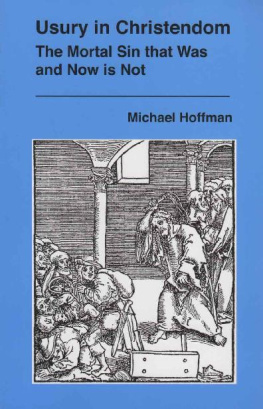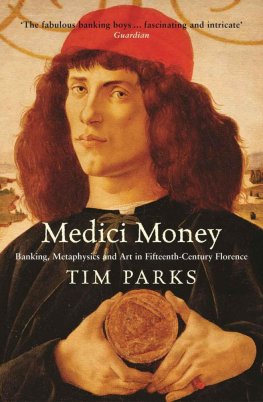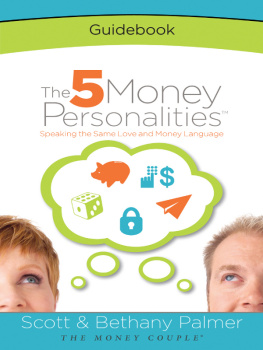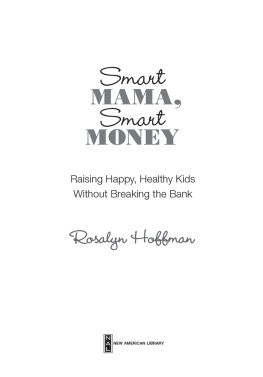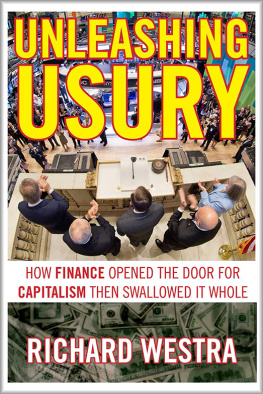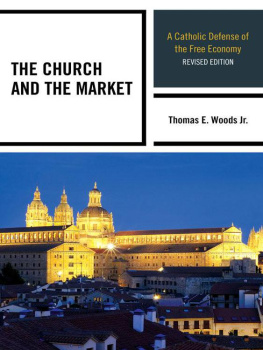Usury in Christendom
Usury in Christendom
The Mortal Sin that Was
and Now Is Not
A Study of the Rise of
the Money Power in the West
MICHAEL HOFFMAN

Independent History and Research

No Man Can Serve Two Masters
For either he will hate the one, and love the other; or else he will hold to the one, and despise the other.
Ye cannot serve God and mammon.
Matthew 6:24
USURY IN CHRISTENDOM: THE MORTAL SIN THAT WAS AND NOW IS NOT Copyright 2013 by Michael Hoffman. All rights reserved. Printed in the United States of America. Except for quotations in reviews or citations in scholarly publications, no portion of this book may be reproduced, or scanned, in any form or manner whatsoever, in print or on the Internet, without prior permission. For information, address Independent History and Research, Post Office Box 849, Coeur dAlene, Idaho 83816.
Second printing, February 2013
ISBN: 978-0-9703784-9-1
An index to the contents of this book is available online:
https://drive.google.com/file/d/0Bwg8nmLrvOTjU1VJaDNVc2p1cVk/view?usp=sharing
Portions of this book first appeared in Revisionist History, issues no. 12, 34, 46, 50, 51 and 55.
Cover illustration: Lucas Cranach the Elder, Christ Drives the Usurers out of the Temple (1521). Cranachs enraged Jesus was celebrated as a burgher Apostle striking out against Fuggereian epithet for the netherworld of contemporary commercial greeda reference to the financier Jacob Fugger, who presided over an Augsburg-based trans-European banking empire (Steven Ozment, The Serpent and the Lamb, p. 16). Ozments reference is to an earlier work by Cranach, Christ Driving the Money Changers Out of the Temple (1510-1511). Frontispiece: Albrecht Drer, Dance Around the Golden Calf (1507).
For the Kingship of Christ
Adveniat regnum tuum: fiat voluntas tua, sicut in caelo et in terra.
TABLE OF CONTENTS
Yahweh, who shall abide in thy tabernacle? Who shall dwell in thy holy hill?He that does not ask interest on loans, and cannot be bribed to victimize the innocent.
Psalm 15: 1 and 5.
Psalm 15 is sometimes explained away by the apologists for usury as being a reference only to the ideal person, just as some Catholic theologians since the Renaissance have established a loophole in Christs command to lend expecting nothing in return by qualifying it as a counsel of perfection and equating it with His instruction to sell everything and give it to the poor, if thou would be perfect. Unfortunately for the usury apologists, Christ did not connect perfection with his command to lend freely.
The upright man is law-abiding and honestHe never charges usury on loans, takes no interest, abstains from evilIt is Yahweh who speaks.
Ezekiel 18: 5; 8-9
The natural form therefore, of the art of acquisition is always, and in all cases, acquisition from fruits and animals. That art, as we have said, has two forms: one which is connected with retail trade, and another which is connected with the management of the household. Of these two forms, the latter is necessary and laudable; the former is a method of exchange which is justly censured, because the gain in which it results is not naturally made, but is made at the expense of other men. The trade of the petty usurer is hated most, and with most reason: it makes a profit from currency itself, instead of making it from the process (i.e., of exchange) which currency was meant to serve. Currency came into existence merely as a means of exchange; usury tries to make it increase (as though it were an end in itself). This is the reason why usury is called by the word we commonly use (the word tokos, which in Greek also means breed or offspring); for as the offspring resembles its parent, so the interest bred by money is like the principal which breeds it and it may be called currency the son of currency. Hence we can understand why, of all modes of acquisition, usury is the most unnatural.
Aristotle (350 B.C.)
When asked,What is to be said of making profit by usury? Cato replied, What is to be said of making profit by murder?
Cicero (44 B.C.)
Whenever you have the intention of providing for a poor man for the Lords sake, the same thing is both a gift and a loan, a gift because of the expectation of no repayment, but a loan because of the great gift of the Master who pays in his place, and who, receiving trifling things through a poor man, will give great things in return for them. He that hath mercy on the poor, lendeth to God. Do you not wish to have the Lord of the universe answerable to you for payment?
St. Basil, circa 370 A.D.
Si quis usuram accipit, rapinam facit, vita non vivit.
(If someone takes usury, he commits robbery, he shall not live)
St. Ambrose, De bono mortis (ca. 386 A.D.)
(Usury is the root of all evil)
St. Edward the Confessor, King of England
As monarch, St. Edward (circa 1003-1066), the last Saxon King of England, banished all who charged interest on loans. Usurers who remained in England were subject to the confiscation of their property and declared to be outside the protection of the law (i.e. outlaws).
A few months before his death, Edwards usury-free England, was a rich and prosperous kingdomLater generations did right to appeal to the good old laws of King Edward. He had become a symbol of a way of life which refused to die King Edward was canonized in 1161. His feast day on the traditional Roman Catholic calendar is October 13.
Usurae arte nequissima ex ipso auro aurum nascitur.
(By the detestable art of usury gold gives birth to gold).
Gratian, Decretum D.47, c.8
Usury is generally prohibited because if it were allowed all manner of evils would ensueIt is clear that practically every evil follows from usury.
Pope Innocent IV (1200 - 1254)
Commentaria super libros quinque Decretalium
In these days prevailed the horrible nuisance of the Caursines (bankers), to such a degree that there was hardly any one in all England, especially among the bishops, who was not caught in their net. Even the king himself was held indebted to them in an incalculable sum of money. For they circumvented the needy in their necessities, cloaking their usury under the show of trade, and pretending not to know that whatever is added to the principal is usury, under whatever name it may be called
Matthew of Paris, English History (1255)
new orders of itinerant friars like the Franciscans and Dominicans organized preaching campaigns, traveling from town to town, village to village, threatening (usurious) moneylenders with the loss of their eternal souls if they did not make restitution to their victims.
David Graeber, Debt: The First 5,000 Years
These mendicant friars supplemented the Lateran texts with their ownhorrifying tales about the ghastly, agonizing fates awaiting all usurers in the eternal fires of Hell.The impact of the Franciscan and Dominican preaching orders also served to convince most secular governments of their sworn duty to enforce the anti-usury bans with harsh, pitiless vigor. Further strengthening the anti-usury campaign were the papal Decretales that Pope Gregory IXissued in 1234. They commanded all Christian rulers to expel all usurers and to nullify all wills and testaments of unrepentant usurers.
John Munro
Usury cries to the children of prodigality in the streets, All you that will take up money or commodities on your land or possibilities, so as to banquet, riot and be drunk, come unto us and you shall be furnished; for gain we will help to damn both your souls and our own.
Next page
